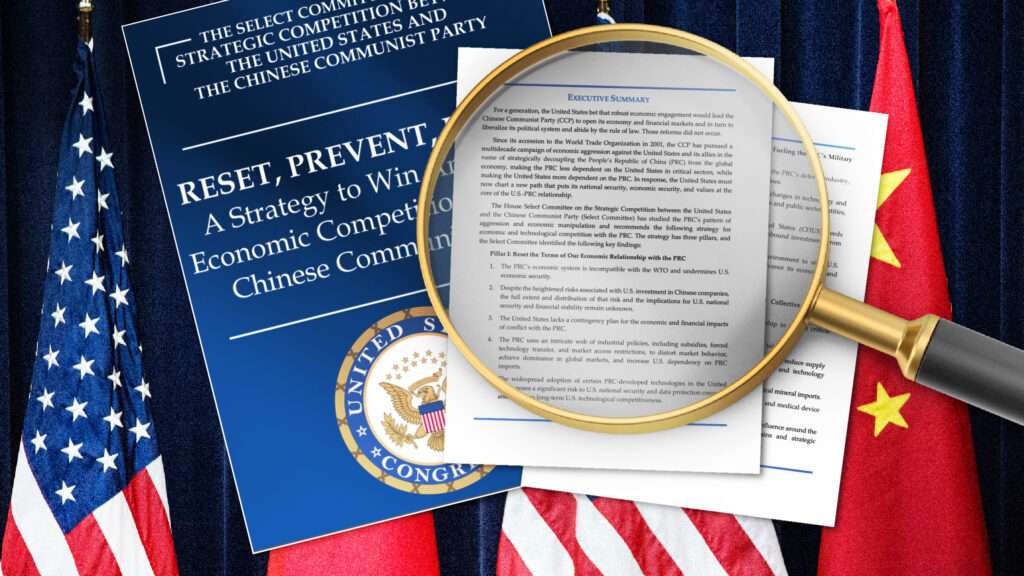WASHINGTON — The Coalition for a Prosperous America (CPA) today applauded a new, bipartisan report released by the House Select Committee on the Strategic Competition between the United States and the Chinese Communist Party (CCP). The report, titled “Reset, Prevent, Build: A Strategy to Win America’s Economic Competition with the Chinese Communist Party,” was adopted on an overwhelmingly bipartisan basis and makes nearly 150 policy recommendations to fundamentally reset the United States’ economic and technological competition with the People’s Republic of China (PRC).
Importantly, the Select Committee’s report acknowledges that allowing China into the World Trade Organization (WTO) and granting China permanent normal trade relations status (PNTR) was a serious mistake that “did not lead to the benefits expected for the United States.” The Select Committee recommends revoking China’s Most Favored Nation (MFN) status and moving “the PRC to a new tariff column that restores U.S. economic leverage to ensure that the PRC abides by its trade commitments and does not engage in coercive or other unfair trade practices and decreases U.S. reliance on PRC imports in sectors important for national and economic security.”
Earlier this year, CPA released an economic analysis that found that revoking China’s Most Favored Nation (MFN) status would result in the creation of 2 million new American jobs, increase real household incomes by $3,647, and increase real gross domestic product (GDP) by 1.75%. A Morning Consult poll of registered voters found that 60% of voters oppose China continuing to receive MFN trade status with the U.S.
“We commend Chairman Gallagher and Ranking Member Krishnamoorthi for continuing their bipartisan work to highlight the threat that the CCP poses to U.S. economic and national security,” said Michael Stumo, CEO of CPA. “Importantly, this bipartisan report recognizes that granting China permanent normal trade relations status was a serious mistake, and that Congress must revoke China’s status to counter the CCP’s economic and trade strategy that has devastated American manufacturers and workers. Additionally, we applaud the Committee for recognizing that CCP companies engaged in human rights abuses and forced labor, as well as Chinese military firms, are being funded by U.S. capital markets. While some lawmakers who are beholden to Wall Street want to allow this to continue, Members of the House China Committee recognize that funding our greatest geopolitical and military adversary through our capital markets is insanity and must be addressed.”
Read the Select Committee’s full report HERE.
The Select Committee’s report acknowledges a number of important key facts about the U.S.-China relationship, including the following:
- The PRC’s economic system is incompatible with the WTO and undermines U.S. economic security.
- The PRC uses an intricate web of industrial policies, including subsidies, forced technology transfer, and market access restrictions, to distort market behavior, achieve dominance in global markets, and increase U.S. dependency on PRC imports.
- American investors wittingly and unwittingly support the PRC’s defense industry, emerging technology companies, and human rights abuses.
- The Committee on Foreign Investment in the United States (CFIUS) needs additional authorities and tools to effectively evaluate inbound investments from the PRC.
- The United States’ dependence on the PRC for pharmaceutical and medical device supply chains poses a distinct national security risk.
CPA strongly supports the following policy recommendations made in the Select Committee’s report:
- Move the PRC to a new tariff column that restores U.S. economic leverage to ensure that the PRC abides by its trade commitments and does not engage in coercive or other unfair trade practices and decreases U.S. reliance on PRC imports in sectors important for national and economic security. This shift should be phased in over a relatively short period of time to give our economy the time necessary to adjust without avoidable disruptions.
- Ensure that the United States’ existing trade agreements with third-party countries, including the U.S.-Mexico-Canada Agreement (USMCA), have strong rules of origin to prevent non-market economies from using our trading partners as a backdoor to gain preferential access to the U.S. market.
- Pass legislation amending the Tariff Act of 1930 to reduce the de minimis threshold for duty-free shipments into the United States with particular focus on foreign adversaries including the PRC. Congress should also direct CBP to strengthen its enforcement against transshipments from the PRC into the U.S. market using the de minimis rule, as it cannot adequately scrutinize goods sent to the United States from the PRC for concerns about forced labor under current de minimis rules.
- Enact legislation like the COOL Online Act (H.R. 6299) mandating country of origin labeling for online-purchased products to ensure transparency, consumer understanding, and clear trade practices in the digital marketplace.
- Create transparency into U.S. investment in the PRC, the recipients of that funding, and the risks associated with it.
- Restrict U.S. investment in entities tied, directly or indirectly, to the PLA, critical technology sectors, or forced labor and genocide.
- Pass legislation to generally prohibit investment in PRC companies included on key U.S. government sanctions and red-flag lists, including the UFLPA Entity List, the Non-SDN Chinese Military-Industrial Complex Companies (NS-CMIC) List, the list established by Section 889 of the John S. McCain National Defense Authorization Act for Fiscal Year 2019, the list established by Section 1260H of the William M. “Mac” Thornberry National Defense Authorization Act for FY 2021, the Military End User List, the list established by Section 5949 of the James M. Inhofe National Defense Authorization Act for FY 2023, the Federal Communications Commission’s “Covered List,” the Entity List, and the Withhold Release Orders and Findings List related to forced labor. Legislation should include subsidiaries and parent or holding companies of these listed entities.
- Enact Leveling the Playing Field 2.0 (H.R. 3882) to update U.S. trade laws by addressing issues such as cross-border subsidies, simplifying investigations into circumvention and repeated product-related inquiries, and strengthening remedies to minimize PRC predatory economic practices.













